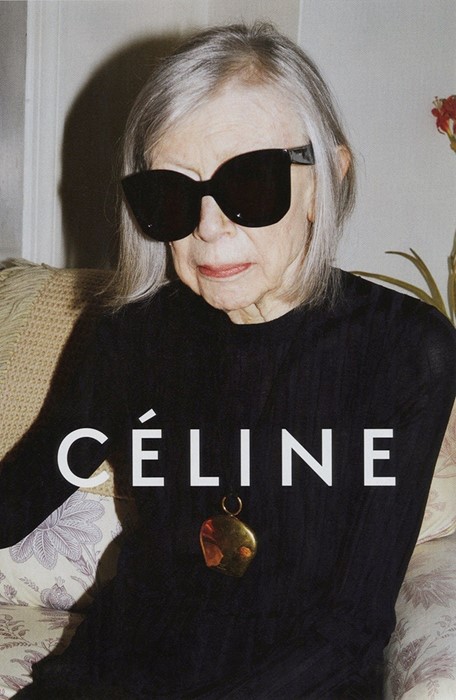published in AnOther Magazine, 24 December 2021
In the wake of the esteemed essayist and author’s death, we look back at some of her most inspiring words
Journalist, author and screenwriter Joan Didion has died in New York aged 87. Known for her clinical, almost alienated observations, her works remain a rare testament to America of the 60s and 70s. In her intimate biography The Year of Magical Thinking, released much later in 2005, she documents her suffering from grief and it is widely considered her masterpiece.
Didion released her first novel Run River in 1963 after a successful seven-year run at Vogue. It paved her way to a prolific career as an author and practitioner of New Journalism, then a predominantly male literary movement. She writes about contemporary cultural, social or political events with detachment, offering surprisingly revealing details. Civil rights meetings, the Hollywood elite, afternoons at The Doors recording studio and the women’s movement are all part of the same microcosmos in which she navigates. Those chronicles of life in her native California evoke a sense of eclecticism and classic Americana, as was perhaps visible in Dennis Hopper’s photography of the time.
Beneath the glamorous outer layer of events lies a surgical dissection of an underlying current. In The White Album for example, she captures the era’s zeitgeist right before the news of the Manson murders broke:
“The phone rang many times during the next hour. These early reports were garbled and contradictory. One caller would say hoods, the next would say chains. There were twenty dead, no, twelve, ten, eighteen. Black masses were imagined and bad trips blamed. I remember all of the day’s misinformation very clearly, and I also remember this, and wish I did not: I remember that no one was surprised.”
True to her love of driving daily on the freeway, portraits of her leaning nonchalantly against her Corvette Stingray became emblematic of the cool, empowered writer. In 2015 she was the face of a Céline campaign, sporting similar oversized sunglasses to the ones she used to wear back in the day.
Although her writings can be perceived as austere or reserved, the following quotes however, demonstrate how this approach could touch a nerve with some, in a way many of her contemporaries could not.
- “Ageing and its evidence remain life’s most predictable events, yet they also remain matters we prefer to leave unmentioned, unexplored.”
- “To free us from the expectations of others, to give us back to ourselves there lies the great, the singular power of self-respect. Without it, one eventually discovers the final turn of the screw: one runs away to find oneself and finds no one at home.”
- “A good part of any day in Los Angeles is spent driving, alone, through streets devoid of meaning to the driver, which is one reason the place exhilarates some people and floods others with an amorphous unease. There is about these hours spent in transit a seductive unconnectedness. ”
- “It kills me when people talk about California hedonism. Anybody who takes about California hedonism has never spent a Christmas in Sacramento.”
- “Our favourite people and our favourite stories become so not by any inherent virtue, but because they illustrate something deep in the grain, something unadmitted.”
- “Grief, when it comes, is nothing like we expect it to be.”
- “Strength is one of those things you’re supposed to have. You don’t feel that you have it at the time you’re going through it.”
- “I tell you this not as aimless revelation but because I want you to know, as you read me, precisely who I am and where I am and what is on my mind. I want you to understand exactly what you are getting: you are getting a woman who for some time now has felt radically separated from most of the ideas that seem to interest people. You are getting a woman who somewhere along the line misplaced whatever slight faith she ever had in the social contract, in the meliorative principle, in the whole grand pattern of human endeavour.
- “I learned to find equal meaning in the repeated rituals of domestic life. Setting the table. Lighting the candles. Building the fire. Cooking. All those soufflés, all that crème caramel, all those daubes and albóndigas and gumbos. Clean sheets, stacks of clean towels, hurricane lamps for storms, enough water and food to see us through whatever geological event came our way. These fragments I have shored against my ruins, were the words that came to mind then. These fragments mattered to me. I believed in them. That I could find meaning in the intensely personal nature of life as a wife and mother did not seem inconsistent with finding meaning in the vast indifference of geology and the test shots.”
- “We tell ourselves stories in order to live. We live entirely by the impression of a narrative line upon disparate images, the shifting phantasmagoria, which is our actual experience.”
- “There is a common superstition that “self-respect” is a kind of charm against snakes, something that keeps those who have it locked in some unblighted Eden, out of strange beds, ambivalent conversations, and trouble in general. It does not at all. It has nothing to do with the face of things, but concerns instead a separate peace, a private reconciliation.”
- “Life changes fast. Life changes in the instant. You sit down to dinner and life as you know it ends.”
Further reading and watching:
